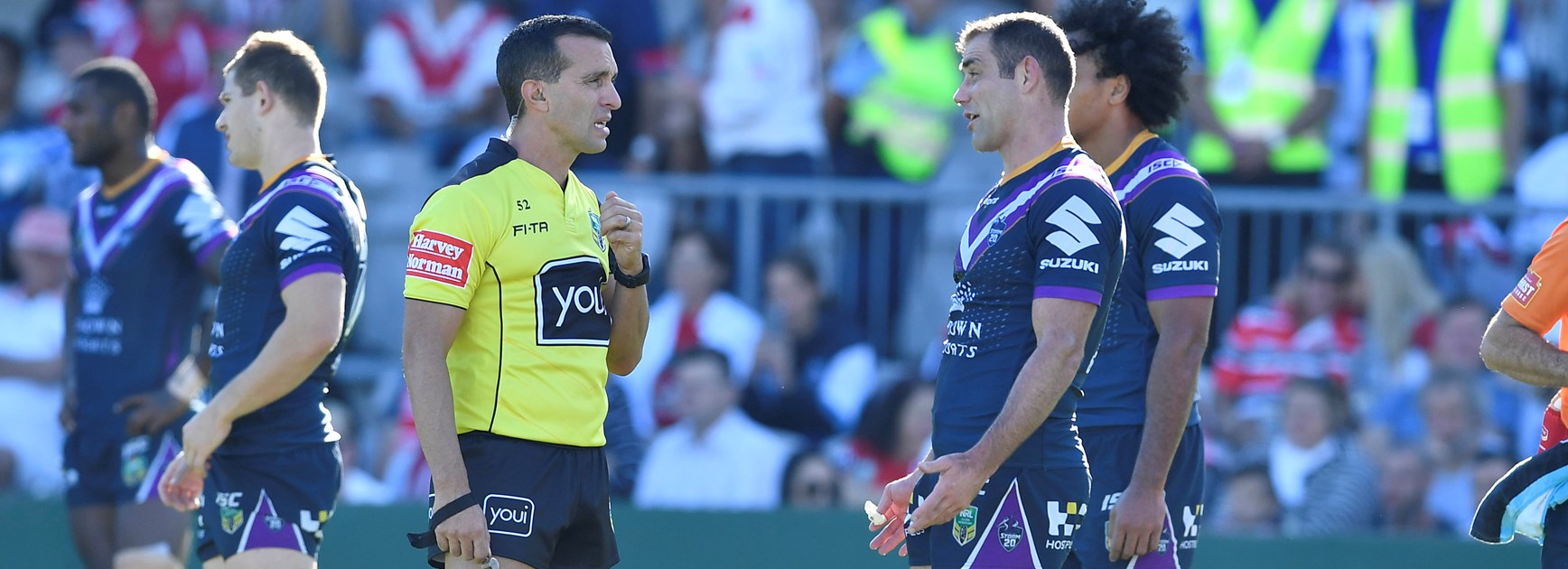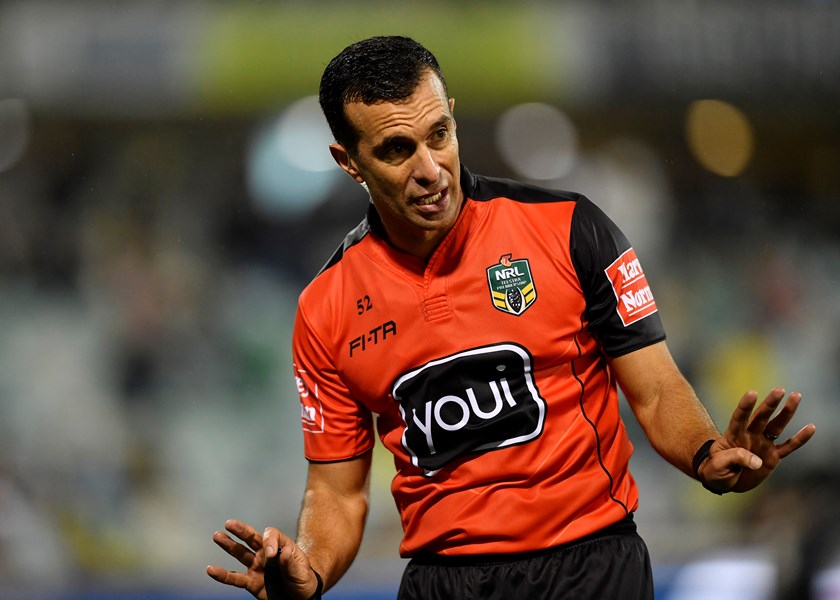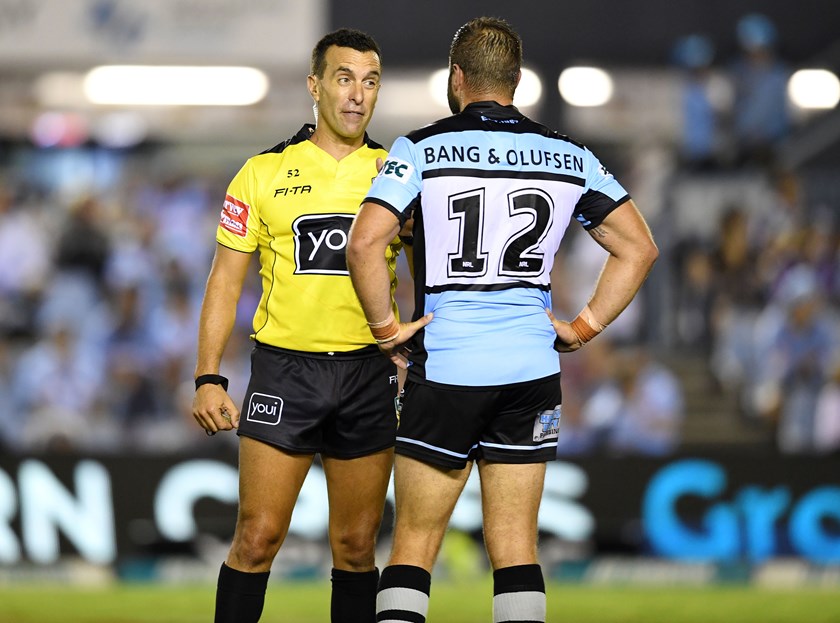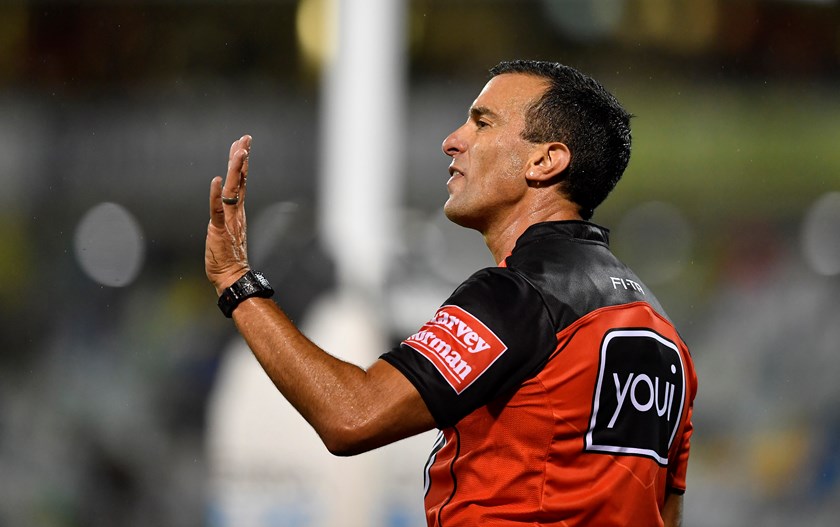
Retiring NRL official Matt Cecchin has made one simple plea to refereeing critics while also offering his suggestions for how to improve the confidence of the squad.
The talented and experienced whistle-blower officiates his 300th game as a centre referee at Panthers Stadium on Sunday when Penrith host the Raiders; this month he also brings up 500 total games in the NRL including sideline and NRL Bunker games while also reaching the 20-year milestone as a first-grade official.
Cecchin said this was the year the "noise" all got too much and after an early-season consultation with his regular sports psychologist, Rosie Stanimirovic, came to the decision this would be his final campaign as an NRL referee.
In a stunning interview with Fairfax Media, Cecchin revealed the death threats levelled at himself and even other members of his family after he made a correct no-try ruling against Tonga in last year's World Cup.
Sitting down with NRL.com in the referees' offices at ANZ Stadium on Friday, he elaborates that it is not just the negative criticism that can get him down.

He pleads with critics to inform themselves before having a crack, he states a case for a full-time sports psychologist to help the team and he insists having referees regularly dropped from first grade over an error is no way to improve performance.
The milestone and the journey
Although his NRL career is closing, Cecchin is privileged to reach a rare milestone.
"It's quite funny, this month there are three numbers that spring to mind," he says.
"It's 20 years in the NRL this month, it's 500 games combined and 300 in the centre. I don't feel like I've been around that long! It feels like a bit of a blank, it's been such a ride.
"When I first fell in love with the game and refereeing, refereeing wasn't a full time job. As I've progressed so has the status of a referee. This is where we're at now.
"Even before that I was an in-goal touch judge in Perth for the Western Reds and I had one decision to make all year for [former long-serving referee] Eddie Ward on a double movement and, yeah, I got that wrong.
"But out of that 20 years, I've never missed a game through injury which I'm proud of. I've been dropped plenty of times, missed plenty of games from performance but never through injury. The reality is I still thoroughly love the 80 minutes, I love the training, I love coming in here. That's not the reason for pulling the pin."
Positive and negative criticism
The 44-year-old is widely praised by fans and media as one of the game's best officials, to the point there was an outcry from some when he was overlooked for this year's State of Origin series. Despite that, there was near universal praise for the way Ashley Klein and Gerard Sutton handled the memorable interstate clash.
Cecchin himself wasn't the slightest bit comfortable with having his name used as a platform to denigrate his teammates.

"It's a bit of everything – the mainstream media, the social media," Cecchin says.
"In part it has been really complimentary to me. People are saying 'how's that having a negative impact on you?' It has a negative impact on me in here [at work]. These are my mates, these are my colleagues, this is my team and they have been for many, many years.
"The decision on appointments is final, [when you miss out you ask] 'what do I need to do to improve?' and you work on that and next time a game comes around you hope to get it and that's what it's all about for us. I took to heart and took personally the negative effect I had on the guys in this office and I just thought 'that's enough'."
But his ability to cope with the "noise" around refereeing performances ran out this year.
"In the past it's had an effect and I've been able to dust it off quite quickly and move on," he says.
"Once I made that call to say 'it's time', a lot of that pressure was coming from myself because the game started to become much more enjoyable again, my performance started to reflect it, my mannerisms on the field started to show that this is something that I love and I'm still pretty good at it. And it's important for me to finish the game with the NRL in high regard. I'd hate to leave in a manner that [people thought] 'he's sort of dragging his feet a little bit'."
Plea to the critics
Cecchin is not naive to the fact coaches, commentators, former players, the media and others will always have a say on refereeing performance but he is stunned by the lack of understanding he sometimes sees in the public narrative.
"I'm astounded that the people that have been in our game, like really knowledgeable, well-regarded rugby league people, whether they be players or coaches … just have no idea what we do," he says.
"I'd love for the people that make comment – they're entitled to and I get why they do it – just come and spend some time with us first. Get an appreciation for what we do.
"Get that message out there, sure, if we need to be accountable, I'm not saying we don't but just have a greater understanding of what we go through and how hard we try to be really good officials."
The complexity of what NRL officials go through is lost on most, he says.
"The often simplistic answers these people have often have a knock-on effect to so many other aspects of the game and this year was a good example with playing the ball with the foot.

"The teams changed it around basically in the trials and started playing it with the foot really quickly however it had a massive impact on the 10 metres because teams were going up sooner than what they could because they've gone up for the last 10 years when the ball's hit the deck.
"That's where we had a big chunk of our penalties. It's that type of consideration that's needed when people say 'just blow the penalty, players will stop doing it' – no, not really because if you just keep blowing more penalties, that side does more defending. That side then becomes even more fatigued and even slower in the play-the-ball which means more penalties again. It's so complicated and that's why I encourage [those who] make comment … come in and spend some time and have a look at what we do and how hard we try and do it well."
Referees are already accountable – dropping us doesn't help
A referee having a clanger – for example the series of errors that led to a crucial Sione Katoa try being awarded to Cronulla against Canberra recently – will often lead to a spell of one week or more out of the top grade. Cecchin says the officials already have plenty of accountability through their weekly feedback and reviews and ongoing performance management without being constantly worried every error will threaten their livelihood in a way no established NRL player faces.
"I often wonder though how much better could we be if we had an environment where the expectation is [some mistakes are inevitable]," he says.
"I've made mistakes in every game I've refereed. It's just that knowledge, knowing that you're one decision away from being dropped or a massive drama and not only do you feel it but so do your family and your friends.
"It's something we all, in this office we all know and accept. That's why when you get the big games you think 'I've been lucky because I'm at the top of the pile at the moment and I haven't had a big controversial decision'.
"But when you miss out you realise too sometimes you're a little bit unlucky, it's like a little revolving circle with a handful of referees. All on their day are very, very competent and could referee any game in the NRL very very well."
Touch judge Ricky MacFarlane made a split-second error to raise his flag for a perceived knock-on in the lead-up to that Katoa try in round 19 and is heading into a second weekend with no NRL game.
"The Ricky MacFarlane scenario is reflective of where we're at now," Cecchin says.
"If you want better officials, consider changing that. Think of the confidence players have and the amazing things they do on the field.
"They don't have that level of pressure, they don't have that level of accountability that everyone bats on about with referees. It frustrates you when people say 'they are not accountable'. Come in here every Monday and look at the robust discussions we have and the decisions we have to make and how we analyse it. We are accountable."
This, more than anything, needs to be addressed to encourage the next generation of whistle-blowers not be scared away from the sport.
Sharks dominating the tackle
"The playing field has to be a little bit more even when you compare it to players," he continues.
"There's no high-level first grade player who would even consider being dropped for one error, even if it costs a side the game. His side would rally around him through the week and make sure he was right the next week. It's not the case with us.
"We have to support and rally around each other but we know that referee is not going to be in first grade next week. That I think has to be looked at and looked at seriously. There are hundreds and hundreds of decisions made by many people in any one given game of football. It's just unfair to beat a referee up for one decision."
Give us a sports psych
Cecchin has already approached NRL CEO Todd Greenberg about hiring a full-time sports psychologist to work with the officials and there's every chance his wish will be granted after his departure.
In part it's to deal with the endless bile spewed on social media. In part it's to deal with at-times vicious feedback through more established media.
"When I first started in first grade I might get one or two articles written about me a year, now there's information on every game that every referee gets from every angle and it's being able to handle that information," he says.
NRL.com Players' Poll - Part 2
"It's unrealistic to tell the guys not to have social media. It's part of life now. We need guys to get assistance in dealing with all that info.
"A sports psych I think can do a tremendous role within the squad in actually helping us be better at making decisions under pressure or under fatigue. Is there a different way to do things?
"We've tapped into the physical component of refereeing for years. There's another chunk of the body that plays an important role that we've sort of neglected through no fault of anyone but we've evolved to a point now where we need to consider it."
You'll never get perfection
The unattainable demand for perfection and total consistency can arguably be counterproductive at times but it doesn't stop the group doing everything they can to get as close as possible.
It's made even tougher by the almost exponential increase in complexity around the rules and the ruck in the modern games.
"When I was first in and around first grade, referees refereed for two hours a week and they made two to three mistakes a game," Cecchin says.
"Now we're in and around the office for 30 hours a week, 40 hours a week and we're still making two to three mistakes a game.
"It's just the nature of what we do and the rules are written in such a way that [in our review] there will be a room full of referees and quite often the room will be split 50-50 whether the referees made the right or wrong call. And these are the top officials in the game.
"That's how subjective our rule-book is. It's not about whether the ball has touched the line or not. There are so many variations in so many different rules. Which makes the game part of what we love but also makes it really tricky to referee sometimes.
"[After a 50-50 decision] we say as a group we need to leave here this week with a more united approach to this scenario so we have a more consistent approach to this."
McGuire charged for hair pull
Match-day coaching now a necessity
All that complexity means the coaching through the earpiece from a match-day coach is now vital.
It's a job often performed by another referee and one Cecchin enjoys. The feedback is just as likely to be initiated by the on-field official asking for help as it is an unsolicited voice in the ear.
In fact, Cecchin says the fractious 33-penalty Storm-Sharks game earlier this year may have panned out differently if he'd received earlier feedback in his ear.
"It's different things [we ask for]," he says.
"Sometimes the speed of the play-the-ball. Is my timing correct? I'm feeling like it's slow but is it because the players aren't getting up quickly to play the ball. Line speed on the 10 metres.
"Sometimes it's runs of penalties; we're under pressure this year especially when we have repeated infringements to start the process through warnings and sin bins and sometimes as a referee you lose concept of that and you need a hand to say 'ok you've had three in the last four or five minutes, if you get another one it's time to talk to the captain and go through the process'."
It's not as simple as just blowing a penalty every time you could – essentially refereeing to the letter of the law – because that's how you get games like the Sharks-Storm debacle.
"You have different strategies as referees you use from time to time," he says.
"Realistically, with every infringement that happens out there if we were [blowing every technical penalty], we would have 30-40 penalties a game. I've done that once this year and that shan't be happening again!
It's just unfair to beat a referee up for one decision.
Matt Cecchin
"I really was trying to do what I thought was right and there's an example of I needed information sooner than what I got it. I got told at half-time that the penalty count was 10-6. It was way too late to caution captains then.
"If I got that information 20 minutes into the game I would reconsider, one, my timing – is it too quick? Or two, is it time to caution the captains, let them know we can't keep blowing penalties and going down the sin bin path earlier? I missed that boat. Then once that boat had gone I had to strap on for the rest of the half and get through it."
What's next?
Cecchin appears totally relaxed about not knowing what he's doing next year but hopes for a shot in the UK Super League.
"If that comes off my partner and I will pack up and bring the dog over and spend a couple of years over there," he says.
"That excites me. New challenges, new games I'd like to be able to achieve. I've had a fair bit to do for a while now with the guys in the UK through different tournaments – World Cup and Four Nations and Test matches.
"If it doesn't come off I'm not sure. I've been working part-time with a company for 15 years. They've offered me full-time employment if I want it. I think after the season finishes I'll take a breather and see what comes up. It just doesn't worry me. I'm not sure what's next but I'm looking forward to whatever that may be."


